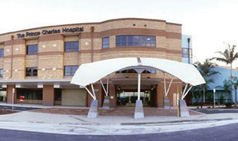|

|
|
Prince Charles Hospital in Wales, the U.K., took advantage of using the best-of-breed products through integration. (Photo by Cortech Developments Ltd.) |
Hospitals have complex security requirements and are faced with a range of threats and risks to patients, staff, expensive equipment and medicines.
According a to a report by the Guardian in April 2001, violence in hospitals had become so widespread that for every NHS Trust in the U.K., an average of 500 violent incidents during the year 2000.
In almost all major teaching hospitals, police presence has now become routine, especially around hotspots like A&E departments. NHS trusts are also employing their own security guards, hiring private companies to carry out round-the-clock patrols, using closed circuit TV cameras and alarms, and in some cases giving staff mobile phones and pagers purely for extra security. Staff accommodation has to be protected from intruders, and trusts have had to introduce tight security in maternity units because of the fear of baby snatching. Many hospitals are also plagued by thieves and vandals.
Jon Richards of Unison commented at the time, “What is important is to analyze where staff are going to encounter problems. People, who work in mental health, ambulance workers, A&E, maternity units and in the community, are all in the frontline, therefore, most at risk.”
This particular hospital trust in South Wales had become so concerned about the amount of violence taking place in and around its maternity unit that it is employing a 24-hour security guard to protect staff and expectant mothers from violent partners. The trust, which runs the Prince Charles hospital in Merthyr Tydfil (near Cardiff) at the time, spent around £250,000 on security.
LONGGING BEHIND ON SECURITY
According to a BBC news report from April 2003 the security at this particular hospital had to be upgraded and improved. This was due to a very old tagging system being in place designed to prevent babies from being snatched. It was not up to speed with the latest technology.
The extra security was part of a UK-wide review in the 1990s prompted by the abduction of Alex Griffiths more than 10 years ago.
Alex was 36 hours old when she was snatched by bogus health worker Janet Griffiths (no relation) from St Thomas?Hospital in south London in January 1990. It was 17 days before police found the baby in a cottage in the Cotswolds.
As part of the overhaul of policies on access to maternity units, Prince Charles Hospital opted to tag infants. This way, any passing through the security system would set off an alarm which would automatically spur staff into action.
INTEGRATED, UPDATED, SECURE
To ensure that the baby tagging system (and the whole security system) was up to date with the latest technology, serious high end integration of the whole security setup was required.
This meant that the Intruder Honeywell Galaxy Alarm system, Synectics CCTV, DM Sprite digital video recorder, Teltronic Intercom system, Janus access control system alarm system & the Elpas Patient Positioning system had to be brought together via intelligent, intuitive integration into a user friendly and powerful graphics user interface.
This enabled the following outcomes.
-
Integrated security management software for controlling and operating all systems Intercom monitoring and graphical display location reporting
-
Manual selection of CCTV cameras to screen from graphic maps.
-
User configuration for CCTV interface enabling any alarm event activation, for relevant camera(s) and preset(s) to switch automatically to verify alarms.
-
Automatic switching of CCTV cameras for live video verification of entry points and access points.
-
Automatic alarm event management of digital recording equipment.
-
Alarm set and alarm reset for a given range of Janus alarms, of a Janus access controlled PC for alarm monitoring only.
-
ELPAS baby tagging & staff attack alarm monitoring. On screen easy access to alarm event pre and post visual verification
-
One operator routine for all systems. Resulting in clear and concise location reporting requiring minimal operator training
-
Operator logging, time, date, action, enabling a control element for management.
-
Single database for false/event alarm management, with analysis and a dynamic database enables recall for playback of pre/post event by clicking event log.
Russell Hoare who is in charge of hospital security for the North Glamorgan NHS Trust commented, “Integration of our existing systems and the addition of new equipment was highly recommended to us as a solution. The GUI is an integral part of the system that ensures a swift and rapid response time from security staff in the event of alarms.”
Nick Honess is a contributing writer, specializing in the integration sector of the security industry.
|
Information Sources
|
|
Rise in attacks on staff blighting NHS
The Guardian, January 2001
http://society.guardian.co.uk/NHSstaff/story/0,7991,430331,00.html
Hospitals step up security as attacks on staff rise
The Guardian, April 2001
http://society.guardian.co.uk/NHSstaff/story/0,7991,472351,00.html
Prince Charles Hospital, South Wales
www.nglam-tr.wales.nhs.uk/
Ove Arup
www.arup.com
BBC NEWS | Wales | Hospital baby-tag flaw
BBC Wales News, April 03 - news.bbc.co.uk/1/hi/wales/2924885.stm
BBC NEWS | Wales | Hospital tackles ward aggression
BBC Wales News, June 05 news.bbc.co.uk/1/hi/wales/4616443.stm
|
For more information, please send your e-mails to swm@infothe.com.
ⓒ2007 www.SecurityWorldMag.com. All rights reserved.
|



